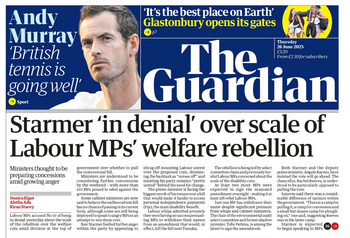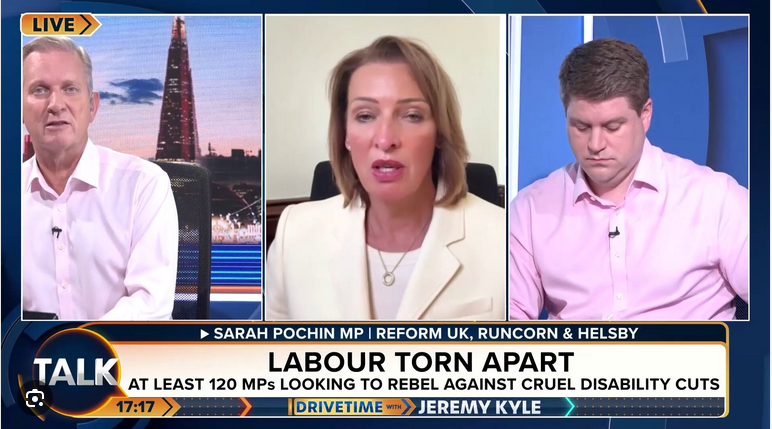Is Starmer finished?

Last night, Sir Keir Starmer, under mounting pressure from across his party and public stakeholders, performed a cautious U-turn on the most punitive elements of his proposed welfare cuts, particularly those targeting disability benefits like Personal Independence Payments (PIP). Initially championing a £5 billion savings package: defending it on ‘moral and economic’ grounds as necessary to curb spiralling costs and incentivise work he faced fierce backlash from more than 120 Labour MPs, charities, mayors, and celebrity voices warning the changes would devastate disabled people, families, and children.
Ahead of a critical Commons vote, Downing Street quietly shifted course, offering concessions such as freezing eligibility for existing claimants and delaying implementation into late 2026, in an attempt to shield long-term sufferers and restore party unity .
This U-turn represents a strategic retreat designed to balance fiscal responsibility with compassion, and to halt rebellion within Labour ranks over plans perceived as punishing society’s most vulnerable. Starmer’s attempt to reduce the welfare bill through punitive measures, involving cuts to social services, tightening eligibility for benefits, or harsher conditions for welfare recipients, cannot be dressed up: it is austerity. While austerity politics are a signature of Conservative governments, for Starmer to adopt such measures under a Labour banner is seen as yet another example of Labour’s profound ideological shift.
Traditionally, Labour has been the party of social justice and support for the working class. By focusing on punishing the working poor rather than targeting wealthier segments of society, like corporations and high earners, Starmer is not only betraying these principles, but he is reinforcing the criticisms already directed at him that he is authoritarian and out of touch with his base. Many Labour supporters view the welfare state as one of the few protections against inequality, so any move that weakens that is viewed as a direct betrayal.

Why this attack on welfare is seen as a mistake
Public Backlash:
- Any cuts to welfare benefits, particularly during a time when many people are struggling with the cost-of-living crisis, leads to public outrage. Welfare is a lifeline for millions, and punitive measures that target vulnerable populations could push many voters away from Labour particularly in working-class areas that Labour has traditionally been strong in.
- Media criticism has been swift and harsh. Starmer has been painted, with some justification, as a leader who is willing to punish the most vulnerable while letting the rich off the hook.
Failure to Target the Real Culprits:
- The alternative, taxing the rich, is a much more straightforward and politically viable solution, especially for Labour. By focusing on taxing high earners, large corporations, and capital gains, Starmer could not only raise revenue but also fulfil the public’s demand for a fairer society. Instead, by targeting the poor, Starmer is missing an opportunity to differentiate himself from the Tories, who have made austerity their hallmark for over a decade.
Rebellion from 120 MPs:
- A rebellion of this scale is huge. This is no small uprising within the party. A 120-strong rebellion signals that the divide within Labour is more significant than just policy disagreements: it's an existential conflict about the soul of the party. Labour's left wing will clearly se this as an attack on core Labour values. Austerity, especially directed at the vulnerable, is something Labour traditionally fights against, not implements.
- If Starmer backed down in the face of this rebellion, it will weaken his authority and show that he can't lead the party through tough decisions. This would be perceived as a failure of leadership, making it harder for him to maintain control going forward.

Wider implications of the rebellion
Internal divisions:
- This rebellion is a big problem for Labour's unity. It's not just a few backbenchers dissenting; this is a massive internal rift. If Starmer loses the backing of such a significant portion of his party, it could lead to further fragmentation. The left wing of the party is already royally pissed off with him and will push for a return to a more progressive agenda, one that tackles inequality, tax justice, and investment in public services, rather than focusing on austerity measures.
Voter trust:
- Voter trust in Labour has shifted from the support that gave him a landslide as trust in the Labour Party has plummeted. If Starmer can't manage his party, and is perceived as weak and unable to defend the most vulnerable, the electorate might lose trust in Labour as the party of the people. This is especially poignant as Reform UK Ltd will scoop up the disaffected. This Is fine in a local election for a council but dangerous in a General election.
The taxing the rich argument:
- Failing to properly tax the rich (or at least introduce progressive tax measures) could also exacerbate perceptions that Starmer is too closely aligned with the establishment or even neoliberal economics. At a time when public frustration with inequality and corporate power is growing, failing to challenge the wealthy is a misstep. Labour voters, especially those who are struggling financially, will likely see Starmer’s focus on welfare cuts as caving in to the political elite.
Where does Starmer go from here?
Damage Control:
- The immediate need is damage control. Starmer must reassert control over the party, and quickly. If he wants to survive this, he needs to put forward an alternative policy that fixes the welfare system without punishing the poor. He could try to shift focus toward progressive taxation, investing in social services, and redistributing wealth, but the damage done by this betrayal would be hard to undo.
Rebuilding Labour’s Identity:
- Labour needs to find a unified voice again. A leadership challenge could be brewing if Starmer doesn’t show that he can manage the party effectively. The rebellion signals a fracture in Labour’s ideological coherence, and the leadership must now decide if it wants to continue down a centrist path or return to a more left-wing, progressive agenda.
Public Messaging:
- Starmer needs to address the public perception that he has abandoned the poor in favour of cutting welfare. A clear, coherent message on the importance of social safety nets, alongside a robust policy on wealth redistribution and taxation, is essential to restoring public confidence.
This moment is a crisis for Starmer’s leadership. His attempt to cut welfare to reduce the bill, rather than taxing the rich or implementing progressive policies, is a severe misstep that has alienated many within his own party and could erode his standing with voters. The massive rebellion from 120 MPs signals a deep fracture within Labour, and the public’s view of Starmer as a leader will be tested in the coming days. If he cannot navigate this crisis and align his party around a more progressive vision, his future as Labour leader may be in jeopardy.
He may not pull through this, there is a groundswell of anger about this bill and the compromise of freezing PIP and not bringing in changes until November 2026 changes nothing: for it still bring in changes and means that people in the same need as people currently in receipt of PIP will not be able to get it. It is still punitive and it still punches down.
Starmer is weak. He doesn’t listen to anyone unless he is forced to, even he knows his job is on the line. Without concession on this Bill he would have lost and he may still do so. Labour is in a mess and he has shown beyond all reasonable doubt that he isn’t fit to lead and the direction he is taking the Party in is the wrong one.

Nothing says the Labour Party is off message more than Reform UK Ltd portraying themselves as the voice of reason against the Labour Party on welfare
And then there’s Reform UK Ltd. Through deceit and subterfuge, positioning themselves as the party of the working class. It is waiting in the wings, watching with glee as Keir Starmer dismantles the very soul of the Labour Party. Every betrayal from the scrapped pledges to the callous welfare plans, creates fresh space for Farage and his mob to posture as the voice of the disaffected. While Labour alienates its traditional base, Reform UK Ltd are positioning themselves, not as champions of the left but as the champions of the ‘left behind’, however disingenuous that claim may be. They thrive on resentment, on anger at a political class that looks increasingly interchangeable. And with Starmer eroding Labour’s credibility among the working class, Reform UK Ltd are poised to fill the vacuum, not with answers, but with easy scapegoats and cynical slogans. If Labour continues down this path, it won’t just be losing votes, it’ll be handing them directly to the far right.
There is still time, just, to turn this around. With a general election 4 years away, the Labour Party has a narrow window in which to reclaim its founding values: solidarity, equality, and a fierce defence of the vulnerable. Starmer’s betrayals, his lies about funding his leadership campaign, his complicity in war crimes, his funding from the Israel lobby, his abandonment of his ten pledges and his ill-judged welfare cuts, have shaken trust both inside and outside the party. But if Labour is to win not just power, but the moral authority to govern, it must reconnect with the people it was created to represent. That means a leadership rooted in honesty, principle, and the lived experience of the working class.
And let’s be honest. Starmer is not the man to do this and his rightward shift into a political landscape already occupied by the Conservative Party has failed. On 23rd of January 2023 in Middle East Eye, Peter Oborne hit the nail on the head, he said Attlee, not Blair, must br Starmer's inspiration. If he isn't Starmer will fail. He was proven to be right, and he has.
A change at the top now, while there is still time, could be the first step in rebuilding the party as a force for justice and in regaining the trust of a disillusioned electorate before it's too late.
A bit of shameless self-plugging here. This is www.TetleysTLDR.com blog. It's not monitised. Please feel feel to go and look at the previous ones on the website and if you like them, please feel free to share them.

